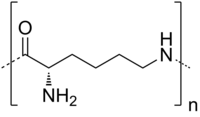
Chiral H-aggregation-induced large stokes shift with CPL generation assisted by α-helical poly(L-lysine) substructure.
Sign Up to like & getrecommendations! Published in 2023 at "Chirality"
DOI: 10.1002/chir.23553
Abstract: Fluorescent materials with large Stokes shifts have significant potential for use in optical applications. Typically, a synthetic design strategy is utilized for this purpose. In this study, we demonstrated a novel method by binding a… read more here.
Keywords: stokes shift; poly lysine; large stokes; helical poly ... See more keywords

A "Cell-Friendly" Window for the Interaction of Cells with Hyaluronic Acid/Poly-l-Lysine Multilayers.
Sign Up to like & getrecommendations! Published in 2018 at "Macromolecular bioscience"
DOI: 10.1002/mabi.201700319
Abstract: Polyelectrolyte multilayers assembled from hyaluronic acid (HA) and poly-l-lysine (PLL) are most widely studied showing excellent reservoir characteristics to host molecules of diverse nature; however, thick (HA/PLL)n films are often found cell repellent. By a… read more here.
Keywords: poly lysine; acid poly; friendly window; hyaluronic acid ... See more keywords

Programmable Electrodeposition of Janus Alginate/Poly-L-Lysine/Alginate (APA) Microcapsules for High-Resolution Cell Patterning and Compartmentalization.
Sign Up to like & getrecommendations! Published in 2021 at "Small"
DOI: 10.1002/smll.202106363
Abstract: Encapsulation of live cells in protective, semipermeable microcapsules is one of the kernel techniques for in vitro tissue regeneration, cell therapies, and pharmaceutical screening. Advanced fabrication techniques for cell encapsulation have been developed to meet… read more here.
Keywords: alginate; apa microcapsules; cell; poly lysine ... See more keywords

Enhancement of ε-poly-l-lysine production in Streptomyces griseofuscus by addition of exogenous astaxanthin
Sign Up to like & getrecommendations! Published in 2020 at "Bioprocess and Biosystems Engineering"
DOI: 10.1007/s00449-020-02372-y
Abstract: Addition of exogenous astaxanthin for improving ε-poly-l-lysine (ε-PL) production in Streptomyces griseofuscus was investigated in this study. By this unique strategy, the ε-PL production in shaker-flask fermentation was 2.48 g/L, which was 67.5% higher than… read more here.
Keywords: poly lysine; exogenous astaxanthin; production; addition ... See more keywords

Comparison of cultured cell attachment on a temperature-responsive polymer, poly-L-lysine, and collagen using modeling curves and a thermal-controlled quartz crystal microbalance.
Sign Up to like & getrecommendations! Published in 2021 at "Journal of biological physics"
DOI: 10.1007/s10867-021-09568-7
Abstract: The characteristics of cultured cell attachment onto poly-L-lysine (PLL), collagen, and the thermoresponsive polymer poly(N-isopropylacrylamide) (PNIPAM) were studied using a quartz crystal microbalance (QCM). A QCM with microscope cameras enclosed in a Peltier chamber was… read more here.
Keywords: collagen; poly lysine; cultured cell; cell attachment ... See more keywords

NIR-II probe modified by poly(L-lysine) with efficient ovalbumin delivery for dendritic cell tracking
Sign Up to like & getrecommendations! Published in 2020 at "Science China Chemistry"
DOI: 10.1007/s11426-020-9780-8
Abstract: Dendritic cell (DC) vaccine is an effective strategy for cancer immunotherapy by carrying antigen into DCs and migrating these DCs to drain lymph nodes after inoculation. In this article, second near-infrared window (NIR-II) fluorescent nanoparticles… read more here.
Keywords: poly lysine; dcs; ovalbumin; nir probe ... See more keywords

Antifungal mechanisms of ε-poly-L-Lysine with different molecular weights on Saccharomyces cerevisiae
Sign Up to like & getrecommendations! Published in 2020 at "Korean Journal of Chemical Engineering"
DOI: 10.1007/s11814-019-0466-9
Abstract: ε-Poly-L-lysine (ε-PL) is a natural antimicrobial cationic peptide. Antimicrobial activity of ε-PL is closely related to its molecular weight (Mw). However, the antimicrobial mechanisms of ε-PL with different Mws are still vague. In this study,… read more here.
Keywords: poly lysine; saccharomyces cerevisiae; lysine different; different molecular ... See more keywords

Self-protection of Streptomyces to ε-poly-l-lysine improves fermentation efficacy
Sign Up to like & getrecommendations! Published in 2021 at "Biochemical Engineering Journal"
DOI: 10.1016/j.bej.2021.107935
Abstract: Abstract Antimicrobial peptides (AMPs) are regarded as a promising new class of antimicrobials. In antimicrobials production by microorganisms, such as antibiotics fermentation, reducing the end-product toxicity based on the self-protection mechanism is adopted to improve… read more here.
Keywords: protection; self protection; poly lysine; fermentation ... See more keywords

Fabrication and characterization of antibacterial epsilon-poly-L-lysine anchored dicarboxyl cellulose beads.
Sign Up to like & getrecommendations! Published in 2021 at "Carbohydrate polymers"
DOI: 10.1016/j.carbpol.2020.117337
Abstract: Pathogens in the food and environment pose a great threat to human health. To solve this problem, we described a novel route to synthesize antibacterial epsilon-poly-L-lysine (EPL) anchored dicarboxyl cellulose beads. Cellulose beads were prepared… read more here.
Keywords: poly lysine; epsilon poly; antibacterial epsilon; anchored dicarboxyl ... See more keywords

A poly-l-lysine-bonded TEMPO-oxidized bacterial nanocellulose-based antibacterial dressing for infected wound treatment.
Sign Up to like & getrecommendations! Published in 2022 at "Carbohydrate polymers"
DOI: 10.1016/j.carbpol.2022.119266
Abstract: Oxidized bacterial nanocellulose (O-BNC) is a favorable material to subdue bacterial infection because of the carboxylate content that not only has a weak antibacterial activity but also is capable of bonding electrostatically to polycationic antibacterial… read more here.
Keywords: oxidized bacterial; dressing; bacterial nanocellulose; poly lysine ... See more keywords

ε-Poly-l-lysine as an efficient cartilage penetrating and residing drug carrier with high intraarticular injection safety for treating osteoarthritis
Sign Up to like & getrecommendations! Published in 2022 at "Chemical Engineering Journal"
DOI: 10.1016/j.cej.2021.133018
Abstract: Abstract A major reason that hinders the clinical application of disease-modifying osteoarthritis drugs (DMOADs) is the unmet challenges in their effective delivery to cartilage. Cationic macromolecules represent promising carriers to enhance the drug delivery to… read more here.
Keywords: poly lysine; delivery cartilage; osteoarthritis; drug ... See more keywords